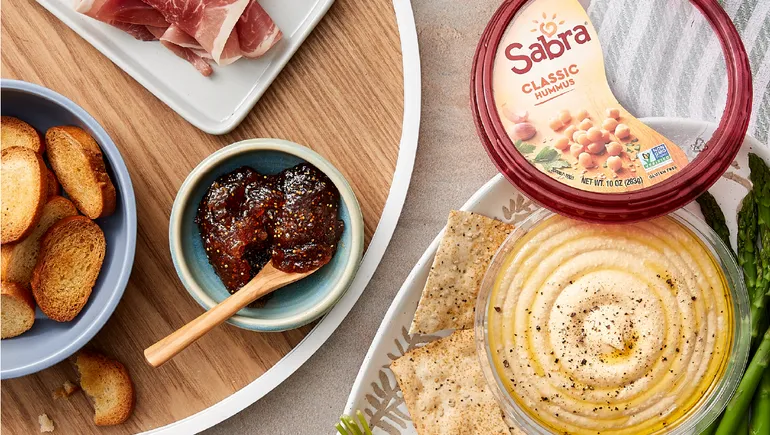
Dive Brief:
- PepsiCo is purchasing the remaining half of Sabra and Obela dip and spread brands that it doesn’t already own from Strauss Group. The Israeli food manufacturer said PepsiCo is paying $240.8 million for the rest of Sabra and $3 million for the remainder of Obela.
-
Pepsico and Strauss created Sabra as a joint venture in 2008, with each company owning 50% of the business. They replicated that model four years later with PepsiCo-Strauss Fresh Dips & Spreads International, which makes Obela. This joint venture operates in Australia, New Zealand and Mexico.
- The transactions help PepsiCo expand its better-for-you food portfolio while giving it greater control over innovation, production, marketing and growth for Sabra and Obela. Sabra has nearly $400 million in U.S. retail sales.
Dive Insight:
As consumers flock to healthy snacks, few brands have benefited as much from that uptick as Sabra.
Still, despite its success, the hummus maker has had a rocky past. It struggled a few years ago with salmonella and listeria contamination which led to recalls going back to 2015. In December 2021, the brand received a warning letter from the FDA highlighting several violations at its Virginia plant that makes hummus.
In September, Strauss reportedly was considering exiting the Sabra venture due to market share loss, declining sales and increased competition. Sabra’s market share is roughly 37% compared to more than 60% at one point.
Still, with the hummus market expected to surge, PepsiCo has an opportunity to rebuild and further grow the Sabra brand. The North American hummus market was valued at $896 million in 2022 and is projected to reach $1.78 billion by 2030, according to data from Verified Market Research.
PepsiCo said the transaction will allow it to “continue to transform its portfolio and drive accelerated innovation to develop more products” that address consumer demand for healthier food.
Executives told Food Dive in 2022 that a major part of Sabra’s growth plan hinged on taking the brand beyond its roots as an offering at a party or holiday gathering and turning it into something more people eat in their daily routine as a snack or during meals. At the time, they said Sabra is recognized by 80% of consumers, but roughly 85% of them only buy the product a few times a year.
Few food companies have the financial resources and deep understanding of consumers as PepsiCo. By owning Sabra entirely, PepsiCo will have more freedom to innovate and expand the brand.
“As we evolve our food portfolio and bring people more choices for more occasions, our aim is to meet the growing demand for positive choices and on-the-go options,” Steven Williams, CEO of PepsiCo Foods North America, said in a statement. “Nutritious, simple foods like refrigerated dips and spreads represent a space we have long desired to expand in the U.S. and Canada.”
The transactions for Sabra and Obela are expected to close by the end of this year.
The deals come nearly two months after PepsiCo announced it would buy Siete Foods for $1.2 billion. The Mexican-American food maker produces tortillas, salsas, seasonings, sauces, cookies and snacks.
While PepsiCo is known for Fritos, Cheetos and Doritos on the food side, the New York-based company has moved aggressively to improve the healthiness of its snacking portfolio through M&A as consumers more closely watch what they eat.
The Siete purchase, coupled with the Sabra and Obela transactions, are significant moves in carrying out that strategy. PepsiCo also has purchased Bare Foods, which manufacturers baked fruit and vegetable snacks, and PopCorners maker BFY Brands.
